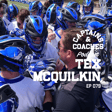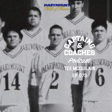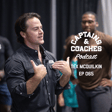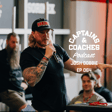Become a Creator today!Start creating today - Share your story with the world!
Start for free
00:00:00
00:00:01

009 - Warrior's Path to Wellness w/ The Vagabond Coach
Tex sits down with Drew Szczecinski, aka The Vagabond Coach, to explore his incredible journey from professional fighting in Japan to coaching weight-loss camps in Thailand and running his own body transformation business.
In this episode, we discuss mindset shifts, empowering individuals, and the unique challenges of leading teams versus coaching 1-on-1. Don't miss these inspiring insights from a coach who’s walked the Earth, you know, like Caine in "KUNG FU."
Training Programs - 7 Day Free Trial
Old Bull: https://bit.ly/old-bull-train
Captain's Speed, Strength, & Swagger: https://bit.ly/captains-train
#CaptainsAndCoaches #VagabondCoach #BodyTransformation #Leadership #MindsetShift #CoachingJourney #RaisingTheGame
Transcript
Introduction of Guest and Leadership Theme
00:00:00
Speaker
Welcome to another episode of the Captains and Coaches Podcast. I am your host, Tex McQuilkin, and today I am joined by the Vagabond strength coach, Drew Sazinski. We discuss his travels to Japan, Thailand, to Chicagoland in all the lessons that he's picked up as a fighter, a coach for fighters, and then taking these lessons and applying them to his general population clients. Drew's a great friend of mine for a long time, so I'm excited to share all his mindset tools, his ability to connect with athletes and hand off these opportunities for you to learn and grow in your ability to communicate as a coach. Without further ado, let's get to the conversation. Ready, ready, and break.
00:00:57
Speaker
Action. Welcome to the captains and coaches podcast live in studio. I welcome Drew Szyński. He says it finally. Thank you. Yes, Tex. It is great to be here, brother. I apologize to listeners. This man asked me 17 times my last name, and I kept saying, yes, you're getting it perfectly every time. It just goes, Szyński. Szyński. Yes, you got it. 10,000 hours. 10,000 hours. Deliberate practice. Yep. That's you, man.
00:01:27
Speaker
Well, Druski, we've known each other for a long time. Yes, we have. Feels like forever. Mm-hmm. Especially on this side of the table. Absolutely. And you're a very unique person. Okay. All right. Long time friend. Yeah. Longer time, vagabond coach. Yes, that is true. Travel the world.
00:01:46
Speaker
So where do we
Drew's Martial Arts Journey
00:01:47
Speaker
begin? A big theme of this podcast is zero to one leadership, that first year where you took on responsibility for either your own performance, yes other people's performance in respect to being a team leader, team captain, or a coach. right And so you coach fighters, you coach people, individuals in their fitness journeys. have an array of experience and then all over the world. All over the world. Not just limited to a specific population either. Right. That's true, Ben.
00:02:18
Speaker
And that was the goal from the very start. I always loved starting the story with just a very nerd reference because, as you know, I'm the biggest nerd. When I was a kid, I always wanted to be Ryu from Street Fighter. So, looking at- That's how you pronounce it? Oh, gosh. It was Ryu. Well, you know what? Ryu? Little Japanese accent in there? A little Hadoken? I would come up playing these video games being like, I wanted to be a traveling martial artist. This is what I wanted to do with my life. I want to do something like an adventure or whatever. And the more I got older, went to college, was a philosophy major. And my professor told me at the end, he goes, you were meant to be a like a vagabond. You were meant to just wander. And I just go, OK. That kept in here. Cane from Kung Fu. Cane from Kung Fu, yes. Walk the earth, meet people. Didn't Jule say that at the end? adventure Didn't Jule say that at the end? Yeah, full fish. just I just need to walk the earth. That's what I'm thinking.
00:03:09
Speaker
Uh, Vincent didn't like that. But yes, that was the goal of the original was just, I wanted to travel and I wanted to train martial arts. How it started was I worked my way up to, went to Costa Rica, got a teffel. So teaching English as a foreign language, okay got to go to Japan.
00:03:25
Speaker
Stayed in Japan and while in Japan still practicing the entire time still training I actually became a mixed martial artist and got to compete In amateur and then actually upgraded to being a professional fighter, which was wonderful So I could teach English on one side and then fight professionally on the other after I had won a tournament I got hired to go coach in Thailand, just coach grappling for people that are trying to get fit. And it was a weight loss camp. So I was coaching fighters and I was coaching, you know, 40 to 50 year old women and men. Yep. In Thailand. In Thailand, right? Of course, for the fighters class, it would be people that were professional fighters. Yeah. And then for people just trying to lose weight is a different class. And I do circuit training and whatnot as well. But it was mostly centered around, hey, I'm going to show you how to lose calories the fun way by strangling each other and hyperextending elbows.
00:04:14
Speaker
It's a lot more fun. Exactly. So I started there and the moment I experienced, and I feel like this is a come to Jesus moment that we all have as coaches or captains, a moment that we find our influence or our wisdom or our lessons coming over somebody so viscerally that they transform not just their body, but their mindset, their perspective on their self, their identity.
00:04:38
Speaker
I was hooked. I was like, this is what I want to do for the
Coaching Philosophy and Vulnerability
00:04:41
Speaker
rest of my life. Fighting was fun, but in no way was I competitive as like, oh, I want to be a champion. It was just like, I wanted to see if I could actually fight. you But the moment I experienced the euphoria of seeing somebody realize their potential, realize their goals, I was like, I just want to feed off this all my life. That's all I want is this emotion again and again and again. And that's what it's been for the last 10 years. That's awesome. that Thanks, man. Appreciate it. It takes a lot of self-awareness.
00:05:08
Speaker
So then a big big part of being a responsible leader is knowing your own limitations, knowing where you fall short. right So not just putting up that guard of to your clients and to your athletes of saying, I'm i'm the almighty, I know it all. Correct. It's now allowing them to see like behind the veil. And I feel taking on the responsibility of both people's performance and then their their longevity, their behaviors,
00:05:37
Speaker
once they leave their their time with you, right that's incredibly important. So then speak to us about, I mean, that moment of clarity, yeah to use another Pulp Fiction quote here, that moment of clarity, and then seeing the other side of it before you had the clarity of what guys, what shield, what walls did you put up as a coach trying to pretend to be something for your athletes.
00:06:01
Speaker
So ah that's a great question. I would say that the conversation you and I are having right now, a couple of chuckles, but a lot of insight is the exact same way you want to coach an individual. I don't ever believe that you're coming to me because you know, I know something that you're trying to get to and I can help you get there, right? But that doesn't mean there has to be this guru call me sensei or anything over that. That hierarchy doesn't have to exist. What I believe does have to exist is real conversations with the individual, meaning this.
00:06:31
Speaker
I have never once come forward being like, I know everything. i have I have so much, look at all my, in fact, walking through your house makes me feel like I know nothing. After all the accomplishments you've had, the certificates on the board and whatnot, I have so few of those. For me, it's always been the ability to sit down with an individual and be like,
00:06:50
Speaker
What do you want? Really? Truly? What do you want? Where do you want to end up? And by me being vulnerable enough to say, hey, I've i've been there. This is what I wanted too. And this is how I got there. Let's see if you and I can get there together. That to me is a true leader. Not and this is the way to do it because I said so. It's we're going to walk this path together, whether it be verbally or physically.
00:07:13
Speaker
and we're both going to get to the point where I know you will reach your true identity. What you truly conjure up in your mind is the life you deserve, that health, that happiness. We're gonna get there together. That to me, that that barrier, that shield you speak of, I didn't really have it because I never looked at myself as somebody that knew so much more. I never went to school, like I'm a certified nutrition coach and I've been certified as a life coach, but God knows how often I've seen people like yourself that have so many years and so many certificates. I had never had that for the longest time. It was just me believing in myself and believing in the work. And if I can get you to believe the same thing, and then in yourself, we'll get there together. Yeah, the the spiritual guide. God, I hope people don't look at me as a spiritual guide. Well, if we're using the the hero's journey as as a version, right? Everybody yeah fails, they hit their wall, and then they have to cross that threshold.
Old Bull Program and Personal Consultations
00:08:10
Speaker
Yeah. And there's a guy to effectively kickstart their journey, their path. I feel that makes me sound old though, Tex. I feel like I have the gray hair for- You eat gray beard? Come on, man. This is hurtful, man. I'm trying here. Trying to look good. I'm trying to rock the George Clooney a little salt and pepper. Is it working? For George? Yeah, fantastic. Don't lie. Gosh darn it. Yeah, I would have had a hair.
00:08:34
Speaker
Time out. Let's take a quick break from this episode to talk training and the old bull program. This is a classic strengthening it oop strengthen character development program that is flexible and efficient, tailored for busy leader, the busy professional. If you are managing or leading teams, this program is for you. You're going to develop physically, mentally, socially, and emotionally. Each block, I target a character trait for you to focus on that is negative and will eat your team alive. This could be anger. This could be envy. It could be a fixed mindset. So you hold the mirror up. We take these challenges on daily with puddles and and information and integration for you to bring into the training.
00:09:26
Speaker
I have two required days split push and pull that are heavy. The rest of the week is up to you for a choose your own adventure style. Different workouts ranging from 60 minutes all the way down to 20. This is a character development as much as it is a confidence and strength and conditioning program.
00:09:47
Speaker
for you as leaders. I want you to look the part, I want you to feel the part, and I want you to lead the part. Try a seven-day free trial by clicking the link in the show notes for the program or bull and give it a ride. Let's get back to the show. Ready, you ready, break.
00:10:05
Speaker
the Well, traditional start to somebody's fitness journey. We can cross both reins between performance and then fitness. Traditional physical starts with like a par-q. Hey, fill out this this sheet of paper about your family history and then maybe somehow goals. So then this initial conversation you're having, what's on your par-q? What questions are you asking to then allow them to shine light on what they truly want?
00:10:34
Speaker
ah That's actually a great thing that I feel most people can do in learning how to be a better conversationalist. When I meet clients, usually it's me giving an hour-long consultation to somebody. And so the questions I ask can be a little bit personal. You're talking about family history. I'm talking about, hey, um what do you want?
00:10:51
Speaker
And then to get more detailed about that, what is your lifestyle like? Do you have children? How's stress? how and How well are you sleeping? What's your hydration like? You'll notice that a little in these questions of like, hey, how much do you walk? What's your physical fitness like? You're getting a lot more emotional questions like, how would you say your happiness is? What do you want to do with your life? I feel like I'm talking to like, what do you want to do with your life? No, it's more about where you're calling on me for a reason clearly there's something you want me to help you transform but for me to do that better i have to know more about yourself so what are you willing to reveal to me you would be so surprised at when trust is gained and i've been hired and when we talk more where the psychological comes into play of like oh i might have experienced trauma
00:11:34
Speaker
And this isn't me in no way whatsoever espousing that I'm a therapist or anything like that, but it's always shocked me when I talk to people that a lot of the motivation to get out of obesity, to get stronger, to to live a life of more fulfillment and satisfaction, it is always calm, not always, but it usually comes with a background of Well, um I was bullied a lot as a kid. Well, I faced a lot of ah violence as a child trauma. Getting over that to become healthier and happier, a lot of those questions when they're addressed makes people realize almost like through the Socratic method of guiding them there, what they need to confront not only mentally and emotionally, but also physically to get where they need to be.
00:12:18
Speaker
You bring up a great ah great question that is very empirical of like, what's your family history? ah ah you know What's your weight at? how These are all questions that of course need to be addressed if we're talking about fitness or trying to get healthier in
Identity Challenges in Athletics
00:12:31
Speaker
general. But I realize more about an individual's psyche and what they really can be coached, the method of coaching that really appeals to them.
00:12:42
Speaker
if I ask them those personal questions. I think if I was to give myself one quality that i'm I'm confident in is my ability to connect to somebody. My ability to look at them and just be like, I do this job for people. and Like, i I get so much out of it. So if I can help you, hell, even if I can give you this free consultation and I can help you, I'm fulfilled for the day. I'm great. You know what I'm saying? That's awesome. Thanks, man.
00:13:10
Speaker
effectively gaining their trust to find the root of their behaviors. I agreed, I don't like that you said gaining their trust, because I feel like you'd be like gaining their trust and then betraying them and crushing them. What would you call it? No, you're absolutely right. I should rephrase gaining your trust. i wouldn't I wouldn't rephrase it at all, I'm just saying. Earning your respect. Earning your respect, yes. Something I'm still working on with you, one day you will respect me and give me a microphone that works. Yeah, well you can't, yeah. Put me in an armbar, respect me.
00:13:41
Speaker
yes yes Yeah, I'm pretty sure you have. My elbow is still jacked up. Well, yeah, you spoke to identity as well. And this is this is something within athletics and team sport is purposely driven. yes Shared suffering. We are going to condition as a team. So that way we start to sometimes the coach can craft and lead. a team to who they are, their identity. This is faked a lot with printing out t-shirts that say some stupid phrase or yeah one word. yeah ah So I like the to apply stress where the team finds their own identity and then the coaches bring on and then we can stick to that word or that theme, whatever it may be. So that allows the the team to have further ownership and they they own that theme. yeah
00:14:32
Speaker
What I also like about that is every year it changes. yeah So that way you can connect it to the principles and the values of the coaching staff, but at the same time, it's autonomy, it's leadership for the individuals. So within difference between the team and working with an individual,
00:14:52
Speaker
There's some identities that, that have gone wrong. This is, this is my bias spoken in there, but when people say, oh, I'm a, I'm a marathoner where I'm, I'm a crossfitter. So they're taking on the identity of these, these healthy exercise, uh, cultures and communities rather than being connected to, I am, I'm a fit person. I am a runner. So where, where have you seen identity go too far? Wow.
00:15:20
Speaker
Very introspective question here because I've been on a part of a lot of teams. I was lucky enough to have a wonderful father that put me in a lot of sports. I will agree with something you said earlier about suffering together. I've never been a part of a team that bonded more over, except with, uh, with combat. So wrestling teams, football for sure, because you're hitting, but wrestling. We can't assume anything. The battling assumptions here, but go on. What do you mean we can't assume anything? Well, it's fine. Sports don't teach the lessons.
00:15:51
Speaker
The coaches and the guides and the leaders of your team taught you those lessons. Even if it is shared suffering, you were doing the drills together, but there was an an overarching guide, a leader, a voice it that then led to purpose of those.
00:16:04
Speaker
Right, but wouldn't you say that even through suffering with a team, and of course you you went to the coach to be on the team, you're still suffering and therefore you do bond with the individuals. Would you not agree? Yes, and it's it's it's a fine line to walk, and I've been on teams where we bonded yeah against the head coach.
00:16:25
Speaker
Oh, see, I've never been apart. I've never had that. So that's interesting. I see your point. That's a good point. I got you, man. Yeah. i had Two college coaches. So if our awesome coach is listening, it's not you. yeah At the same time, like the shared suffering, it doesn't always lead to a good representation. It can also then break teams to where, and this is sometimes we see this in football. If there's one quarterback who maybe labeled as the starter and he's boys with half the team. right And then somebody comes in, steps in due to an injury or a poor play. And then he he just executes and wins. Then half the team starts to lean this way. right And so when the now the coaching staff has to battle this QB controversy and ESPN loves to jump all over that. right So those are interesting team dynamics.
00:17:18
Speaker
I see you getting into the details, which is fascinating to me. So I just don't want you to throw out assumptions out there. And I, yeah, I didn't mean to cut you off. No, no, not at all. You were aligned with identity earlier. I'm glad you did. I'm just saying, but would you say though, that what I was bringing this up for was like wrestling and football. There was a lot of bonding through suffering because there was, there was combat involved. There was a lot more hitting. Would that be, can we agree on that? If it's directed appropriately, yes. Those are awesome representations of sports that are physically
Team Identity and Leadership Lessons
00:17:48
Speaker
demanding. Yeah. And a lot of physical contact and that, that contact, and then, I mean, there's research behind it.
00:17:56
Speaker
it was It was done with basketball, but more high fives that a team did the closer they got. Okay. So all right physical touch, yeah meaningful touch. Now we're bringing at least male teams closer together. Okay.
00:18:09
Speaker
Um, I don't, I would assume that female teams would feel that too. I don't know what the research is. Oh, okay. Um, but anyway, getting getting back to what we were saying originally, I wanted to jump on. I enjoy the fact that you put out that suffering, there's bonding there. What you said before, I definitely can attest to that in football and wrestling. And then of course, as I got older and into mixed martial arts when I was 18, uh, when you're a part of a team and you literally fight another member of your team,
00:18:32
Speaker
to train, it's why you're bettering each other through that combat, through that competitiveness. And I enjoyed that so much. And I felt so much were not more of an identity to say, like, you know, hey, I'm a part of Tsurunuma Gym, which is where I was in Japan, or like, hey, I i train in American top team, which is where I am right now in Florida, in ah palm Palm Beach Gardens. Those that pride in that identity of of the team, I enjoyed much more when there was that, but because you really feel like you're going through something. In fact,
00:19:01
Speaker
I believe, I could be wrong in this, but I'm pretty sure this was the story. For the movie Fury, the director had the four actors, Shia LaBeau, Brad Pitt, and and the other two, their names escaped me, one of which was the Punisher, and he's awesome, he has a great podcast himself. they were They were all instructed, I believe, to box each other for the first two weeks, like that when they would they would they would spar each other to bond more in that combat zone.
00:19:25
Speaker
I think that's fascinating. And, and so I definitely wanted to, and and like you said, I enjoy this and this is probably why y'all should listen to the podcast, uh, getting super deep into how, well, Hey, you know, sometimes suffering can cause divisions, especially if the coach does something wrong or like you you get a great story of the quarterback. However, what I wanted to focus on is that I personally.
00:19:44
Speaker
And I think that would be be seen in a lot of situations have bonded so much more with my team and in in these in these sports of wrestling and football and now mixed martial arts through that shared, like, wow, we did something tough together. And because we believed in the unity of what we stand for, that identity you were talking about, I felt like we we accomplished it. And then we grew, we we superseded and transformed as a team as well as an individual because of our shared efforts together. I liked that.
00:20:14
Speaker
I like that a lot. yeah And um I would say for the question that followed, I believe was to say is is when was identity? Could you was the when where have you seen it spin out and go spin out? Personally, I have not in my in my group team. I have not. I've never seen.
00:20:32
Speaker
on my high school football watch I played, which was only very short one year or wrestling, nothing ever spun out in a way where the identity of the team was a ah force of division and in my experience, and certainly not in the MMA teams I've been a part of. What I'll give back to you, and I would love to know your opinion on it, have you ever had an experience where you had, because I haven't had this, a coach the way they ran the team, actually the the identity that they chose for their team and was a negative influence because I've only experienced in the positive. So for you who have been a part of God knows how many sports teams, what was it like for you? Can you give me an example on your end?
00:21:14
Speaker
Yeah, it was my freshman year. We had a coach. He he was a Division I player. Yeah. And then he started for three years on his Division I squad and then got beat out by a freshman his senior year. Okay. So there was a lot of resentment associated with it. Yeah. And then how I feel he was using our team to take out all that resentment and whatever he was holding on to. I see.
00:21:42
Speaker
because then he would push certain people's buttons yeah and drive them to either quit or to continue to play in spite of him. So by the end, he I was only there for, I mean, he was only there my freshman year. But by the end of that, like the whole team, so guys had, I was only with him for one year, guys that were with him for three yeah plus years.
00:22:12
Speaker
There was just a deep-seated hatred. And of course, as a young, bright-eyed, bushy-tailed freshman, you're gonna listen to the juniors who are phenomenal course players and athletes. of course So that balance, and then to the film room, it was very torturous for certain individuals. okay okay So they had a lot on their shoulders as team leaders. Then he let them know every every little up So there there was not not a shake of positive reinforcement. So then I experienced that level of
00:22:54
Speaker
just negative intent from leadership and head coaches in high school football. yeah then I had been, I didn't know how the the weight of toxic shame was also Irish Catholic. Yeah. but That'll stay with you. That'll stay with you. Yeah. yeah Okay. i'm I'm used to this. yeah Actually, this fuels me. yeah yeah So then just not understanding the true weight that came from from all those negative years and then now you dive into perfectionism and it all all catches up to you eventually. So that freshman year, I was a model right for how to act. So he used me just because, I mean, I only knew once one speed go hard yeah until you you die. It was like a cheetah, right? So now he used me as a model and representation of how to act and behave.
00:23:44
Speaker
which just go go sprint hard, yeah use your body as a weapon. That's all I knew, I couldn't catch, so I'm gonna go through you. So you used me as a model. So fortunately, I had a great relationship with the guys, so they didn't that didn't turn resentful for them. Wonderful. They knew me well. They got it, yeah. And they wanted me to actually catch and throw and be succeed and help the team. Yeah, yeah. So then they could prove head coach wrong. So very interesting dynamic, but then eight,
00:24:14
Speaker
Eight days. I can't remember. It was eight days or two weeks before our first game. I broke my leg. Okay in practice so now I'm Sitting on crutches the whole time and just observing right now the team dynamics and I can't I can't be a model I can't participate. I can't steer the ship. You can't do anything, right? Except like just be an ear and try to motivate these dehoots who just have the weight of the world so Needless to say, within the first semester of my sophomore year, he took another job with another school. And we had to go through the hiring process. But they were relieved. Right. Of course. Their senior year, now they got to experience the fun of sports again. The fun of sports. Key point of that. That, to me, was always the thing I came up with. Well, Division III, it needs to be fun. It has to be.
00:25:07
Speaker
ah Dude, I have a couple comments, man. First and foremost, I'm so sorry you had to do that. I can only imagine as a freshman how much pressure that put on you and then the impotence of being able to have to sit on the sidelines and not display who you were for so long physically being able to, but still being the best leader that you could be by motivating your team and and being there. I feel like that is a lot of pressure for somebody. The stories now. Yeah, of course. the Probably the funniest one is he,
00:25:36
Speaker
Like we walked in the locker room one day before practice and you put like lists of everything, one, two, three things that you could do better to improve your game. So the nitpicky is details of 25 dudes. yeah And then on my locker, it's like heal your leg.
00:25:55
Speaker
that's but yeah like yeah oh got you yeah yeah ah and but Yeah, all all lessons to turn around and then now apply right should be versus holding resentment against him as an individual or Sports and athletics and everything all together. Yes, which that I mean, I'm able to navigate, but a lot of guys weren't. yeah They quit yes because the coach, not anything else. You came to school to play the sport yeah and you quit because of the coach.
00:26:27
Speaker
It's like the it's like the the inverse. It's the thing that you would expect not to happen. You expect to be the opposite, is that you got into it and you stayed because of the coach. It was a positive influence. And I think that's what this podcast, I would hope, is trying to do, is to make sure that that remains the paradigm.
00:26:45
Speaker
Right. I would also give you some back is what I've heard from the MMA community now the
Empathy in Coaching Fighters
00:26:50
Speaker
lucky I've been very lucky enough on my coaches, every coach I've had from whether it was in Chicago, Florida, Japan, even Thailand when I was getting coached the the coaches were always so about the team and so about the individual. So we had, hey, as a team, we gotta be here, we gotta do these things. As an individual, Drew, I want you doing this. Kevin, I want you doing this. Like, Akira, I need you to go here. They were always so attuned because I think the danger of being like, hey man, you're about to in the next three months get in a cage where somebody's gonna try to kill you. There's a lot more pressure. You know what I mean? There's a lot more pressure like you have to do
00:27:27
Speaker
these things to make sure you are safe to make sure you're ready psychologically physically ready to be in there so I've also heard in the negative style now of course there's hazing but I think that can be any sport when you go into the big time gyms which once again I've never experienced I have heard horror stories of coaches looking at potential fighters as dollar signs like do you have it or do you not if you don't have it I have so many fighters that I'm already I don't have time to waste on you and They'll just throw him to the wolves like I don't know be this guy sparring partner and this dude just destroys this guy and the coach goes Hey, man, keep your hands up into the guy that he's you know, that is the the brings in the money Okay, once you do this better this bait spends way more time coaching only certain individuals and Really leaving everybody else alone because just he didn't see it there's a lot of times I've been to gyms where fighters come over and their record is like ah
00:28:17
Speaker
Currently right now there's there's a people at American top team Palm Beach Gardens and there's been fighters I've experienced before that were at another gym where the coaches were just like, ah, you know, I got nothing for you. Like, you know, didn't even really care. And then he came over with like, uh, you know, a two and five record and then.
00:28:34
Speaker
My coach currently, Vince Stark, is amazing and so considerate and thoughtful of his fighters. He stayed with the guy and brought up his wins just because he's like, no, no, you're a fighter here. So I'm going to treat you as my fight. You are, I will attend to you. And I think that's something that's so wonderful about positive coaching. We've talked about this before is what an identity.
00:28:54
Speaker
to be a part of this team, this gym, and to know that the coach will have your back, will call you if you don't come in. Hey man, you all right? You doing okay? We'll compliment you when you do something right. If you do something wrong, never make you feel horrible, but just bring it to your attention. Hey, you gotta work on this, you gotta check yourself on that. But hey, all in all, I liked this round, we're doing well. That sort of understanding of that particular individual's nature and being able to to use it to better them, that's a coach.
00:29:24
Speaker
And if you can use that with that identity, I think it's fantastic. Yeah. So that's what I love because the coach is taking on the responsibility and the identity of a coach. Yes. Where they are they know they're going to be outside the arena, but have that best man in the arena intentions.
00:29:42
Speaker
at at mind in setting the goal out three months in advance and knowing their responsibility. And it's, yeah, not using them to then improve their, I guess their bank account or their name. Yes. Especially with what you were talking about before or working on some sort of a revenge to get back at some people and going back to your story, which is ridiculous, man.
00:30:07
Speaker
It's funny. Now, I enjoy how you say, it's ridiculous as I'm like, I'm a guest at it. And you're like, yeah, it's kind of funny. Yeah. I, I, sliding doors theory, I would have stuck it out for the four years. ah I don't know if I would have gone to grad school there and, and started coaching because I started coaching for the second coach yeah we had. I don't know. Was it the note on your locker leg? Gotcha bro. Was that the last straw?
00:30:34
Speaker
No, I had plenty of chips on my shoulder yeah to to pursue. I'm sure. Yeah, there's a lot there. Dude, so fighting. Now, do you feel that you had to have stepped in the ring to be a good companion and coach and guide for fighters?
00:30:57
Speaker
Oh, 100% for fighters, not for coaching. And I i truly believe and we I guarantee you we can have so many examples of great fighters that are bad coaches and average fighters that make incredible coaches. i And I- It's literally the choice I was about to get. I was about to be a great example of that. And for a jiu-jitsu community, and I apologize, I don't know if he competed or if he was a successful competitor, but John Donahur is, I feel, like the ah genius of jiu-jitsu. Probably, I think, the most winning winningest coach, if I can say that, ah in jiu-jitsu. And I don't know if he had, like, a specifically successful career. I really don't.
00:31:36
Speaker
But all I know is that there are people that also are incredible fighters or or players that are not good coaches because they have that a different mentality that is so unforgiving for themselves that then when they impart that on other people, it produces the opposite effect. Okay, so ah I will say this.
00:31:57
Speaker
as a fighter when I, and I had a very short career because all it was, I think, i let me see. So four amateur fights, one semi-pro fight, two pro fights, one a tournament, so one 2-0-0, and then I was supposed to fight again, and then I just fell in love with coaching, and I had told you before.
00:32:13
Speaker
I never was looking to be a champion. I just wanted to see personally if I could fight. And once i I settled that, I was like, oh, like it's not just in the gym. If I get put on the spot, I have the ability to win a fight. That fulfilled me as a martial artist to be like, okay, now I just have to keep training this and should anything happen on the street or whatever, I'd be able to handle myself and protect my friends, family, loved ones and myself, which I've had to do before.
00:32:34
Speaker
And because of ah martial arts, it always ended peacefully as somebody not hurting anybody else. Being nice. and Being nice, man. I got it. How many sources can I tell you of like a fight avoided simply because I'm like, hey, I'm wrong. Let me buy you a drink. And the guy's like, oh, thank God, man. I didn't want to fight either. And then we get drink we get drinks together and become friends. ah But because I fought,
00:32:56
Speaker
I have the ability to understand the grit. I have the ability to understand the grind because I was really, really scared a lot of the time. And how I ah sublimated that fear was I trained really hard and I studied really hard. What do the best fighters do? What is my coach saying? What can I do to get to the level they are? Because I don't want to be knocked out in front of my friends and family. If I have the ability to access Hey, if this podcast was around, I'm sure this, any sort of means or media where I can learn to be better at this given thing, I will do so and I will do so with fervor because it's not just shame on the line. It's my health. It's my health. It's my wellbeing. I have to make sure.
00:33:39
Speaker
And I will say this, and and I know you've coached teens before. I have the opportunity to coach adults. And one of the things I've noticed ah is how worried I get for the fighter that comes in, you know, four days a week or something like that, has a horrible diet, maybe maybe still drinking, and God knows I love to drink, but when I would fight, I would three months off booze. like ah like But you can just see like, hey man,
00:34:05
Speaker
I see in the gym, but like you do know we're fighting in like two months. or When are you going to step up? When are you going to like that feeling I have in me of worried for the fighter that really I feel makes me a better coach because I understand um the blood sweat and tears it is to win and to lose. I understand what that is like as well to get you there.
00:34:28
Speaker
i I have the, ah what what would be the word that we're looking for here? Perhaps the sympathy, because I've been there. I've ive sparred these hard rounds. I've been with people that were, I was very lucky. I had three sparring partners that made it to the UFC. So I knew what it was like to train hard, to go hard. And to be able to impart that with positivity, with, ah hey, i I can understand you. I've been in your shoes, right? I've been in your wrestling shoes. I know what you're going through right now. I know you don't want to do the road work. I know it's so easy to eat the pizza. I know you hate water. I don't know why. Whatever it may be. Yeah, dude, I don't get it. Still like to some people are just like, I don't like water. Point being, if I know these things and if I have the ability to understand you as an individual and speak to you in a way where I know that you will listen and you know that I care about you.
00:35:14
Speaker
How can I not be a good coach for you? yeah And that that is a lot of it. And that's why I don't think it's never, it's never been, it has never been, I just want to win. It's never been that. It's been, can I transform how you think about yourself and about this sport? Can I do that by not only the advice I give, but the care I show and the actions that I lead with?
Healthy Competition and Confidence Building
00:35:38
Speaker
That's very important.
00:35:41
Speaker
few things here and we're going to go in order as you presented them where you were an athlete and you were thinking what are the best doing? So where where did that mentality come from?
00:35:55
Speaker
I can tell you exactly where that came from. The quote is, what they can do, you can do. It was Bruce Lee's best friend, Dan Ensanto, and he signed ah my certificate when I went to go train with him, what they can do, you can do. And so I had this complete faith, um because this happened in college when I was training with him, I had this complete faith that if Daniel Cormier If this was his method of training because I wanted to have the same style of pushing forward and using wrestling and boxing to overwhelm an opponent, I could follow his techniques. If Mike Tyson took his fear of having nightmares about this person beating him and wake up at three in the morning and run, I can do it at five zero in the morning and run. If Mike can do it, I can. I might not be able to do 3,000 squats in one day like he did, but the mental part I could do. If if it says that I can lose 30 pounds by doing paleo, and I'm looking at all these fighters' diets, and they're they're eating just meat, and they're drinking a lot of water, and they're eating their veggies, and they divide it up into meals that are small enough that it just consistently fuels them. And if I can do that, I can lose this weight too. I can be that disciplined. I can be that good. I can be that excellent. And then finally, to have the ability, and this is so sincere,
00:37:06
Speaker
And I feel like I'm preaching to the choir here. To be able to, in my moments of silence, talk to myself in positivity and be like, you're doing good. you or You deserve this win. You've been giving everything. You've been listening and you are just bleeding in that cage, man. You're putting yourself out there. Good job, keep doing it. Instead of like, man, I got destroyed today. I'm eating horrible.
00:37:33
Speaker
I'll never win this fight, but but to be able to change your mindset just like the pros do. I hired a hypnotherapy or a hypnotherapist when I was fighting ah to make sure that i that i my visualization, my self-talk, sports, what do they call that? Is it sports science? It's psych?
00:37:50
Speaker
Sports psychology, yeah, yeah, sports psychologists, thank you. That was what ah my particular hypnotherapist involved, the sports psychology of visualization about me taking people down. I was a big time wrestler, loved getting people to the ground and then staying on top of them and whispering sweetly in there for them not to move and just lay there.
00:38:08
Speaker
That's hilarious.
00:38:14
Speaker
Sorry, I'm going to spit out all over the place. Go ahead. visit Getting a visual here. and And another thing you said, just the yeah connecting with the athletes and then teenagers. I enjoy like the middle school teenager group because there there's usually a moment.
00:38:33
Speaker
And I've worked, yeah, sixth grade, seventh grade, eighth grade individually, and then JV for, like, 9, 10. And so, like, there's a moment where having fun with sports, it stops being hanging out with your boys and playing grab-ass, and it starts being getting better. Yeah. It's starting to be good. Yeah. Skills start to click. The schemes with the offense and defense, like, they they they finally make sense. Yeah.
00:39:02
Speaker
after the coach repeats themselves a thousand times. So that that moment, and it comes at different phases and stages for the whole team. So sometimes it clicks with... ah will and then it takes takes junior, maybe a couple months, maybe a couple of years. Eventually, like he realized, dude, I'm actually pretty good. And now I continue to have fun by getting better. And then we start to train healthy competition versus like a negative aspect and like pointing across the, the crosstown rival. And then using that as, that's not the best fuel. all Right. We want to compare themselves to who they were yesterday.
00:39:42
Speaker
Right? The Jordan Peterson approach versus the, the crosstown rival. And, or even worse, inner squad comp, like, uh, I want to use competition because competition's healthy, but like saying that you're better than teammate, junior. Yeah. Because now then we start to have unhealthy things and they stop relying on each other yeah and start not trusting each other.
00:40:09
Speaker
I agree with you, I would say also a wonderful thing is to have healthy rivalry. amongst the team. So like I, God knows how many rolling partners I have and rolling in terms of jiu-jitsu, it was just sparring partners that I have where I'll be tapping them, you know, a couple months and all of a sudden they learn something and they hit, they hit it on me and they get me. And there's a disappointment of, ah, I got beat, but there's also a joy of, dude, you learned something awesome. Like you did that, you beat me and I've been beating you for a while and now you just beat me with this thing. That makes our team stronger. That makes that person stronger. And of course I care about him because he's on my team.
00:40:43
Speaker
And so when you're talking about like, you know, I want to beat my team member, I agree with you. That's ah that's a ah bad mindset to have because it's going against the team. However. If it's I want to, I personally want to get better. And if we can grow together as a team by winning and losing over each other, but we're, we're both growing. Cause as you know, defeat teaches you a lot. Taught me a lot when I got tapped out last time. Um, that gets you to that point of getting more and more closer to excellence as a team. Yeah. So I want to expand on that. Please do misinterpreted. And I've said this in practice a lot. There's a fine line between being a good teammate and being an asshole. Yeah.
00:41:21
Speaker
So in a lot of that, being an asshole, if I'm looking at you and you're JV, starter first year sport, and I'm starting varsity, and now I try to overpower you and just put you into the ground. Right, but you can't though, right? Well, that's being an asshole. No, I'm saying, because I'm bigger and stronger than you, right? So we can't use it. You're small. In this scenario, I get to win. Come on. I don't like this scenario. Yeah, so then. Yeah.
00:41:50
Speaker
it'd be a great representation of leadership now, where you try to try to put on a move that you're not so good at versus your best move. Yeah. So now, if in lacrosse, you can go right handed, I can go left handed. If I'm a right handed, I'm going to practice my left hand against the weaker opponent. Right. So that way, I'm getting better at a lower competition on that particular skill. Right.
00:42:14
Speaker
that's not being an asshole. Yeah. So then it's then being a good teammate because now I'm trying to build him up, build him up. Exactly. And now if I'm a starter and you're a starter, and we're going against each other. Now, now I'm going full tilt, right? Because with the mindset of I'm trying to get you ready because I know our competition, you're going against starters. I'm a starter. I'm trying to improve your ability yeah so I can trust you. And if you shut me down and I'm giving everything that I got, I'm not going to get angry. You throw my stick and mad at you. Right. I'm going to start to build trust because, okay.
00:42:53
Speaker
you shut me down. Right. I need to work harder, but I can still trust you against the best on their team. Yes. So one on ones are awesome. Yeah. Yeah. And then it's, it's a part of practice for team sports. Yeah. But then it is the sport for, for fighting, which is, which is awesome. So like, imagine where we just spend eight minutes in practice. Yeah. You spend eight hours. Yes. A week. Right. Right. Yeah. Quick quick side story I want to throw at you, which is just a great example of a great partner. I was super nervous my first semi-pro fight. i was It's the first time, obviously, in front of a lot of people. I was in like i was in a ring, so which is the first thing for me. And i was I was so scared. And I was just like, gosh. And of course, this happens every time. I compete in jujitsu. I get the same butterflies. I'm just like, I'm scared. But I just zone in. I get super focused.
00:43:43
Speaker
And this guy's name is Naoto Miyazaki and he had a very successful career in MMA, still does, awesome guy. And he came up to me and in Japanese basically told me, he's just like, why are you so nervous? And I was just like, I was just like, man, like, you know, this is my first time. And I tried to explain it to him in my best Japanese I could give him about like why I was just like, you know, first time in front of a lot of people. And then he just, he stopped and he goes, he goes, Andrew, we've sparred together. I'm really, really good.
00:44:11
Speaker
and he goes he goes he goes and you do well against me this guy is nowhere near your level you're going to crush him it was just this belief that he's just like we suffer together look at my record i'm really really good and you do well against me and this is the guy that slaps me around with his feet like he was an an incredible karate guy he was very good at fighting and but he goes he goes uh that that confidence of we went to war together over and over again And I'm telling you, you're better than this guy. I wouldn't lie to you. And then I went in there and won in a minute and 30 seconds. And that that really calmed me down with him being like, do you not believe in our team? like We've gone through hell together. You're better than this guy. Get out and win. It was a great, it was a great great partner. And I thought that was wonderful. Dude, that is awesome.
00:44:58
Speaker
any other ancidote stories like that, give you I'll give you a coaching one. This is always one of my favorites to tell because it's so it's so plain. It is so plain that I feel like every coach has experienced it, but I love to highlight it because it it really does show what coaching is all about.
00:45:20
Speaker
i had I had this one guy. I used to hold mitts for him. He wanted to lose just you know cardio burning. This was years ago. I was in Chicago. I was actually doing it at at a CrossFit gym with with a guy. I had my own clients coming in.
00:45:32
Speaker
And this guy was kind of a pretty big boy. Wanted to lose like 60 pounds. And we had we had done a lot of sessions together. I had built up a repertoire with him and a truss. And I gave him a simple circuit of I want 50 push-ups, 50 squats, 50 sit-ups after the Mets. And let's see where you're at. He finished it, I think, in like eight minutes or something like that. Got down and was really, wow, that was hard. I'm like, I'm proud of you, man. You really did great. and i really You pumped him up. I was like, can you imagine you beat that in 10 minutes? What do you think your next score is going to be? Two months later.
00:46:03
Speaker
he He comes in regular day, and he goes, hey, I want to try that circuit again that we did two months ago. I go, all right, bro, let's do it. Let's crank it out. I played last of the Mohicans, promontory man, just getting them hyped up, smacking them on the back. like And this is just 50 push-ups, 50. But just getting like, dude, this is it. Let's go. He beats it. it's i'm I'm sitting there wide eyed watching him. He's so much faster. He's so much more. He's yelling as he's like, let's go. On his last push-up.
00:46:32
Speaker
It's 49 and I'm sitting there looking at him and staring at my stopwatch. He's at 6 minutes and 15 seconds and he does it and he goes, time! And I go, 6.16 and he loses it, just pumps his fist, starts getting choked up, by seeing start I'm getting choked up. because i'm And it's just a circuit. But you have to understand, in the two months between the first time he did it and the second time, he had grown so much into self-belief. He had lost weight. He felt more like he he deserved what he came in here for. He paid the money. He put in the hours. He knows he can do something better. Empirically, all of a sudden, his time is shortened. He realizes he's so much stronger because of his effort. And it strikes him so hard
00:47:18
Speaker
that after 50 push-ups, 50 squats, and 50 sit-ups, he's crying. And I'm getting choked up. The goosebumps I feel over something so simple as a better time in a circuit, but to observe an individual that it means so much to him that for the next month, he's going to go home. And when his head hits the pillow, he's going to be like, I did it. I accomplished something.
00:47:43
Speaker
I breathe that, that is so fulfilling to me because it's the triumph of human spirit and it never gets old, ever. I can tell you some cool stuff I've done that I've, you know, like every fight that I've ever had, I've cried afterwards just because I'm so happy about how glorious the struggle was to get there, the three months of training, the the the hard nights where you're like, dude, I suck at this, what am I doing? Like all the nights where you beat your own, you beat yourself.
00:48:10
Speaker
to keep going and then to get just your hand raised and you go in a back room and you cry like a baby and hopefully nobody sees you. You're just so happy. you're So you just that's glory. And I can't tell you how thankful I am that people in sports that have good coaches experience that because it's very rare. It is a very rare feeling to give your all.
00:48:32
Speaker
physically, mentally, emotionally, and spiritually, and then afterwards feel like I've transformed into the better version of myself, the identity that I think of myself as.
Life Lessons and Personal Growth
00:48:42
Speaker
I've gotten closer to that. a I have yet to find a better pleasure besides sex. Yeah, it's and important that you're there to reinforce his view of himself. Of course.
00:48:59
Speaker
A lot of, yeah, a lot of coaches wouldn't take that path. And then we see that in where people leave it out in the field to use that term. And then in film or after the game, coaches MF them. And then they're not reinforcing the effort. yeah They're actually getting ashamed now. And then it starts to to spiral and we start to see that play out. So then you knowing that well and seeing this man's moment,
00:49:30
Speaker
And it's a workout yeah versus ah an Olympic event, but still giving him the same praise and energy that the coaches at the Olympics give. That's awesome. So you said earlier, transform how you think about you. So now what if you start to hear negative things and athletes saying negative about themselves, their performance or hit you with the body language. yeah this is This is all over high school sports. It's like what's actionable things for coaches to, if you hear this or see this body language, how do you start to turn around versus just be more confident? Dude, a couple of things. First and foremost is I cannot stress this enough, never lie.
00:50:23
Speaker
They'll pick that up. You never lie. Hey, you did a great job out there. If they didn't, don't lie to them. Now this is very important. because the positivity that you can instill in somebody during defeat, at their lowest moment, to remind them that what happened out there can better be prepared for by doing these things, that you still were in the arena, you still chose this thing that's hard. Defeat is a natural part of life. It's going to happen. It's the only way you can get better at something, is suffering. It's the only way you can get better.
00:50:58
Speaker
If you are currently feeling bad and shameful, you have to destroy shame, it's the lowest vibration. Guilt is okay insofar as like, why do you feel guilty if your conscience is telling you something, right? That's fine.
00:51:10
Speaker
But you have to be able to sublimate that into action that is positive. This is where the coaching comes in. To be able to look that man or woman in the eye and say, hey, listen, you went out there today and you did your best to perform. If you don't feel you did your best, listen to that feeling and let it hype you up to train better for the next one because we're not done by a long shot.
00:51:33
Speaker
I am proud that you showed up and you did what I thought you could do out there. like you know even because There's a lot of time that people understand this. I will give you a great story right after this that's involved in this, but people will sometimes literally give everything and still experience defeat.
00:51:49
Speaker
you have to remind them of that. It's like, hey, you trained your ass off for this. You went out there, you performed well. This person on this day was just better than you. And that happens. There's many talks I've given to people. I'm like, you were winning the fight and he just caught you. And guess what? That's the sport. These things happen all the time. I think what's cool about being on a team sport, and maybe you can correct me, but like,
00:52:11
Speaker
As a wrestler, you train as a team, but you're on the mat alone. As a as a ah as a fighter, you you train as a team, but you're in there alone. So you take on those losses like I lost. But on a team sport, it's that like, it's we lost. So there's everything we could have done. we We can figure out as a team. We win together, we lose together. I love that camaraderie, but it is something to ah take a little bit off your shoulders. Like, okay, it wasn't just me. Some other mistakes remain. Good coaches do that. Right, right? That's very important. But as a fighter, it's very hard to remind somebody, like, hey, it's it's just you in there, right? um And so to tell that person,
00:52:47
Speaker
There are things that we could have done differently, but sometimes that's just the name of the game. You should have no shame in your performance if you truly gave it all. I'm going to tell that story. It's the best advice I ever got on fighting, and it's it's beautiful. I was lucky enough to be Thailand was hired by Christian Dahio, who is the greatest Italian Muay Thai kickboxer in Thailand. ah Perhaps not the greatest, definitely a legend though. I think he was the first Italian to fight in Limpini Stadium, if that's how you pronounce it.
00:53:15
Speaker
An incredible man, incredible man. He won a boxing fight and came home, like Western boxing, came home. He's undefeated. And I think he he had over 200 kickboxing fights, which is not uncommon in Thailand, especially for his age. And I asked him, I was like, what's the deal, bro? like you don't You don't look happy with yourself. And he goes, I didn't.
00:53:36
Speaker
Train as hard as I could have in this camp and I know I'm better than this guy and he was beating me And I got lucky I hit him with ah a perfect liver shot and dropped him um But I think like I was getting tired and that makes me upset. and I'm just like, yeah, but True, but you won the grit and I'm trying to talk me as a sit-down. Let me tell you something I'm sparing you my horrible Italian accent by the way, you should be thanking me and he said this he goes Let me tell you there's four situations that happen as a fighter one You do everything right. You train twice a day. You do your road work. You eat perfect. You have great hydration. You're really you're putting everything out of the way except this fight. You obsess over it.
00:54:19
Speaker
And then you lose. If that happens, you should feel no shame. Because literally, hey, on this day, this person was just better than you. You can't control that. But what you could control, you did. And you did it excellently. So there should be no shame in your spirit. The second is... You don't do anything right. You slack off. You're not doing road work. you're you're You're coming into the gym, but you're not putting in the work. You think you're ready. You think you're set because you've done it all before. You get in there and you win. And that's what I'm feeling right now, which was, did I even deserve it? Like, you know, I didn't even feel any real growth from this. What am I doing in there? And it's great. I got i got lucky. I got lucky.
00:55:01
Speaker
Third scenario, it's the same thing as the last one where you don't do anything and then you lose. yeah How horrible do you feel? You could have won this fight, but by your actions beforehand, you had two to three months to prepare for this fight and you didn't do a darn thing that could have beat this other person. How much shame do you feel? That is hell. That is what we avoid at all costs. But I'll tell you what heaven is.
00:55:31
Speaker
working your ass off for two to three months, everything dialed in, and then achieving victory, the glory you feel. Let's work on that last one, achieving victory by doing everything possible. There is no better feeling, that is heaven. And I asked him, I was like, what would be the best scenario for you? And he goes, I kinda wanna go out like a Spartan, I wanna go out in my shield, I wanna die in the ring. I'm like, all right, dude, that's great. fine He did. Oh no. He did.
00:56:00
Speaker
And I really, really liked that man so much. I shared so many great moments with him. When I heard about this, of course I grieved, but there was a very large part of me that was like, I'm proud of you, man. Like why don't you you you've said what you wanted to and it happened. And I wish it wouldn't have. I wish you would have lived to the right bait of a hundred, probably still fighting. But he always said he wanted to go out in a shield and he got knocked out and didn't wake up, unfortunately.
00:56:27
Speaker
uh... so god bless him and uh... may rest in peace as a legend he was amazing amazing man but i always remembered that story i think the first podcast i ever went on grappler's union i told that story it's uh... it's one of my favorite and i hope people listen to it because the things that you do i mean is feel like this is stoicism one-on-one but it's like the things you can control control them your mental game your nutrition your road work your endurance everything the training listen your coach having faith in your team control those things Win or lose, you have nothing to be a ashamed of because you did everything you could. That's what one One thing that i I tell coaches often is like your athlete's a lot of you. Movement never will.
00:57:14
Speaker
So this great quote tax this is body language. This is preparation and training. Because a lot of time when we're coaching sport, I got to hand off the training versus strength and conditioning. i'm I'm in the weight room with them. When I hand off the training packet or the programming online, they are going to say they're going to do it.
00:57:35
Speaker
And then they come back, and their preparation is is as clear as day. It's black or white, whether they did it or not. So they would they will lie to you. They'll say they did this and that, but their movement will never will. So that applies to both body language and the the the preparation is you're speaking to there.
00:57:53
Speaker
So now, how important is the body language? So we can we can aim to hear words and try to correct them and shape them, but you understand movement and the the body so well, how important is putting someone in an upright position and to be connected to their body and allow them to start to believe.
00:58:16
Speaker
their words that they are starting to to shape and tell themselves. You are somebody that far exceeds me when it comes to understanding the ah the anatomy, especially the anatomy and and the proper um complexities that human beings go through and they do proper movement. That is your area and I defer to you. However, what I will say is when I observe fighters,
00:58:39
Speaker
when I observe anybody that I'm coaching, if I see heavy breathing, if I see downcast eyes, if I see somebody shying away from their training, not going 100% like they're used to because we have a repertoire, I know what you look like when you do good.
00:58:55
Speaker
And for the last week you've been doing, hey, because i we sometimes we have bad nights, you know, that happens. But it should be me spotting, this is an individual that is usually on fire, raring to go, doesn't shy away, loves the gunfire, and is in here ready to train. And then the last couple sessions you've been lacking, that's when you pull them aside. I hate the rod, I don't need it. What I wanna do is to lead you.
00:59:22
Speaker
And so instead of me being like, why do you suck right now? Right. That's not going to happen unless, unless sort of make them laugh. Like, it's just like, then that you can play off humor like that. ah My coach, whenever I missed a session, he would text me, he goes, did you quit? Because i he knew he would just get, that would rile me up and it was, that was our reference to that. But I would come over and be like, how do you think you're performing this week, man? I've been noticing a little lackluster for me. What do you think this is?
00:59:46
Speaker
to bring it to them and just say, well, you know, things are going on ahead at home or I don't know, I've just been feeling off or I'm nervous about my fight. Why do you think that is? Socratic method of questioning to get them to the truth so they can finally say whatever it may be and then noticing my reaction. Well, if you're not gonna put in the, no.
01:00:05
Speaker
It's, okay, what can we do to turn this around? How about this, bud? You want me to hold mitts for you tomorrow morning? Why don't we make a private? you know let Let me be here for you. Let me help you. Would you mind? Would it be okay with you? Or if they're young, would it be okay with the parents asking and the parents, can I check in on you? Can I talk to the parents? hey how he's How is he doing?
01:00:22
Speaker
showing an invested interest in the individual, making sure they know that they're cared about, that not only do you notice when they're off, but you're willing to do something about it on your own personal and private time because you do care. That in itself brings them this Well, he believes in me, so I should be believing in myself. That's what's gonna be. I understand there's a quick fix of stand up straighter, get in there, and there's a time and place for that, especially at a fight camp being like, hey, run harder. That motivates people. You know, the Mickey training, like, you know, come on, yeah, son of a, like that does something for certain groups of people. But if I've seen a guy who's coming in, whose girlfriend just broke up, I had ah um had a client, a remote client, that ah God bless his soul lost his ah partner.
01:01:09
Speaker
passed away and that was something that we had to get over with, right? I've had fighters and teens were not going good at home. I've had romances that end, right? You're going to get a person. You're never going to get a machine. So when they're not doing something correctly, it's not because the functioning is off. It's because the head space isn't there and you as a coach that cares or as a human being that has bonded with this person, you should want to pull him aside and be, or her aside and be like, what's going on? Can I, can I help you with this? What can I do for you?
Future Plans and Social Media Connection
01:01:44
Speaker
Or just being in this man, like I've been there.
01:01:47
Speaker
We've all been there. i'm One of my favorites, and then I'm kind of close, so one of my favorites is that I was coaching a 16-year-old in wrestling and eating he came in and he sat down and he was doing shots on me. And I just picked him up and sat him down. I'm like, what is it? And he goes,
01:02:05
Speaker
I got in a fight with my girl last night. Coach, I think we're done. I'm 38 at the time and I just just had to stop myself from laughing because I'm just like, bro. like it's but And I sat down and I go, I go, I want you to look around the room. And he did. And there's all these big MMA fighters. And I go, every single one of these people.
01:02:22
Speaker
have been broken up with they've had heartbreak and let me tell you man it sucks you're gonna be fine and we're here for you as a team and you can come in here and you can train five percent i don't care i'm here for you i just need you to know that and i want you to know too you will fall in love again and life is going to be amazing again just right now it's a little hard but you're not alone we've all been there and we're all here for you He got up, he was a little choked up, but he got up and the entire thing switched around and he was going hard and we were laughing and you know I was messing around. I made it way more about fun. I'm throwing them all around and just making them laugh. And I think those are the moments that this podcast is so influential for and it's so wonderful is that there was an opportunity.
01:03:08
Speaker
And I took it to be a leader of this young man to show him something that had nothing to do with wrestling. And yet everything to do with sports that we come together as a team. And I think you do that very, very well. Well, I appreciate you, dude. And thanks for coming on the show, making time, sharing good stories, wisdom, and guidance. And that'll do it for the episode. Where do people, where can they go to learn more about you following along in your journey? and just to have a good time. I have a cardboard box I'm living in right down this way. Sounds about right. Yeah, no, I believe it or not, man, I'm doing, I'm in Florida and then back to Chicago and then going back to Japan. So I'm going to be in the next two months, we're going to be moving. But you can always reach me at my Instagram, the Vagabond Coach. And you can also email me, andrewski296 at gmail.com. I do, I'm going to flip this table, bro. I'm going to flip it. I'm just so angry. The Nick Cage mug is flying. This is it. So there you go, buddy.
01:04:07
Speaker
All right, Druski,



















